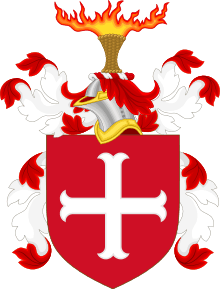patroon
English
WOTD – 18 December 2016
Etymology

The coat of arms of Kiliaen van Rensselaer (born 1586; buried 1643), a Dutch merchant who founded the Manor of Rensselaerswyck, the largest and most successful patroonship in New Netherland. It occupied what is now mainly the Capital District of New York.
Borrowed from Dutch patroon (“patron saint; boss”), from Middle Dutch patroon, from Latin patrōnus (“protector; patron”).
Pronunciation
- IPA(key): /pəˈtɹuːn/
- Rhymes: -uːn
- Hyphenation: pa‧troon
Noun
patroon (plural patroons)
- (US) One of the landowning Dutch grandees of the Dutch colony of New Amsterdam, especially after it became a British possession renamed as New York.
- 1835, Andrew Reed; James Matheson, “Letter XIX”, in A Narrative of the Visit to the American Churches, by the Deputation from the Congregational Union of England and Wales. [...] In Two Volumes, volume I, New York, N.Y.: Published by Harper & Brothers, No. 82 Cliff-Street, OCLC 421539636, page 222:
- Dr. Tucker accompanied us on our return; and we made a call on General Van Rensselaer. He is the Patroon, or Lord of the Manor here; and is considered the greatest landholder in the United States.
- 1844, “a citizen of Pennsylvania” [pseudonym; J. Churchman], A Few Plain Facts, Addressed to the People of Pennsylvania, 3rd enl. edition, Philadelphia, Pa.: J. Crissy, printer, No. 4 Minor Street, OCLC 80750381, page 3:
- In the United States the labourer is a freeman, lives on good substance, and being an honest man, neither fears nor envies the richest patroon about him.
- 2008, Louisa Wood Ruby, “Dutch Art and the Hudson Valley Patroon Painters”, in Joyce D[iane] Goodfriend, Benjamin Schmidt, and Annette Stott, editors, Going Dutch: The Dutch Presence in America, 1609–2009 (The Atlantic World), Leiden: Brill, →ISBN, ISSN 1570-0542, page 27:
- One of the earliest “schools” of American painting, the Hudson Valley patroon painters, has often been considered to have derived from seventeenth-century English portraiture. Portraits of English aristocrats appeared to Dutch patroons as displays of the kind of social status they aspired to in their new country. […] Frequently overlooked in the discussion of the appeal of British portraiture to Dutch patroons is the fact that English portraiture of the seventeenth century was, in fact, a direct descendant of the Netherlandish portrait tradition.
- 2008, Reed Sparling, “A Novel Way of Colonizing: The Patroon System”, in Hudson Valley Voyage: Through the Seasons, through the Years, Fishkill, N.Y.: Involvement Media, →ISBN, page 21:
- Unlike other American colonies, New Netherland was founded as a commercial venture, but the Dutch West India Company soon realized that it needed people to exploit its investment. […] Jeweler Killiaen Van Rensselaer, a company founder, came up with a solution: the patroon system. Established in 1629, it granted near-feudal rights to any wealthy merchant – or patroon – who agreed to populate the valley. In exchange for taking on the costs of establishing mini-colonies of 48 or more settlers, the patroons were allowed to negotiate with the Indians for the purchase of huge tracts of land, which by law would remain in their families forever.
-
Derived terms
Related terms
Afrikaans
Etymology 1
Noun
patroon (plural patrone, diminutive patroontjie)
Synonyms
- (template): sjabloon
Etymology 2
Noun
patroon (plural patrone, diminutive patroontjie)
Etymology 3
Noun
patroon (plural patrone, diminutive patroontjie, feminine patrones)
Synonyms
Dutch
Pronunciation
Audio (file) - Hyphenation: pa‧troon
Etymology 1
From Middle Dutch patroon, from Medieval Latin patrōnus.
Noun
patroon m or f (plural patroons or patronen, diminutive patroontje n)
Synonyms
- (boss): baas
Derived terms
- patronaat (“patronage”)
Etymology 2
From Middle Dutch patroon, from Old French patron (“model”), from Latin patrōnus.
This article is issued from
Wiktionary.
The text is licensed under Creative
Commons - Attribution - Sharealike.
Additional terms may apply for the media files.